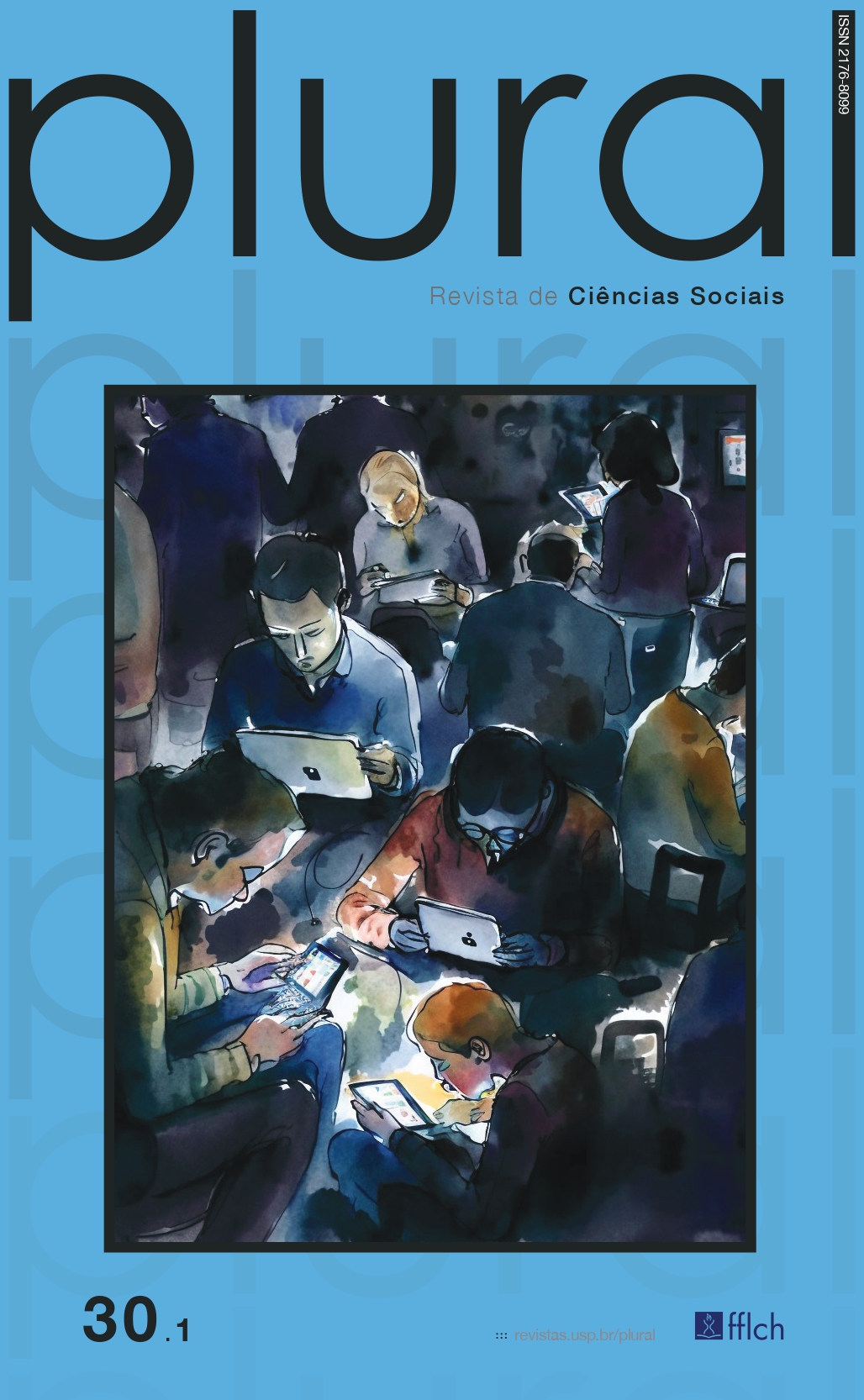How do divided societies come about?
DOI:
https://doi.org/10.11606/issn.2176-8099.pcso.2023.196765Keywords:
Divided society, Inequality, Asymmetrical dependency, Sociocultural polarization, Inclusion and exclusion, StrangersAbstract
The paper looks at divisive forces in contemporary societies and it links them to the unfulfilled hopes of the revolutions at the beginning of modernity: the hopes for equality, freedom and fraternity/solidarity. There are, first, in the 21st century situation, persistent inequalities that emerge in all the function systems of society and become divisive as soon as there arises a discontinuous split in the distribution of rewards, a split that makes it improbable that someone might switch from one to the other side of a distribution. There are, second, strong, asymmetrical dependencies that are connected to an escalation of controls by which persons and groups control resources wanted by others and furthermore build up controls regarding the actions, communications, exit options and ways of perceiving the world being available to these other ones. The more control dimensions are implied in a specific social relation, the stronger and more pervasive asymmetrical dependencies become and then definitely separate in society those who exercise controls from those who are objects of control. There is, third, as a structure of division the rise of sociocultural polarization that creates a split between significant subcommunities of a society, on the basis of which communities perceive the members of other communities as strangers and as dangerous for the values and life forms one regards as essential for one’s own community. The paper finally explains these societal divisions by studying them as forms of inclusion and exclusion. Inequalities come from cumulations in the inclusion dynamics of function systems; asymmetrical dependencies emerge in institutions and groups that absorb persons that are being excluded from relevant participations; polarizations are based on reciprocal and totalizing exclusions by which communities define the members of other communities as radical ‘others’.
Downloads
References
AHLERS, Anna L., Damien Krichewsky, Evelyn Moser, and Rudolf Stichweh. (2020). Democratic and Authoritarian Political Systems in 21st Century World Society. Vol. 1 - Differentiation, Inclusion, Responsiveness. Bielefeld: Transcript.
AUTOR, David H. (2014). "Skills, education, and the rise of earnings inequality among the "other 99 percent". Science 344:843-51.
BANFIELD, Edward C. (1958). The Moral Basis of a Backward Society. New York: Free Press.
BOHN, Cornelia. (2006). Inklusion, Exklusion und die Person. Konstanz: UVK.
BURT, Ronald S. (1992). Structural Holes. The Social Structure of Competition. Cambridge, Mass.: Harvard U.P.
COLEMAN, James S. (1990). Foundations of Social Theory. Cambridge, Mass.: Harvard University Press.
DICKENS, Charles. (1848). Dombey and Son. Oxford: OUP, Oxford World's Classics 2008.
DIPRETE, Thomas A., and Gregory M. Eirich. (2006). "Cumulative Advantage as a Mechanism for Inequality." Annual Review of Sociology 32:271-97.
DURKHEIM, Émile. (1893). De la division du travail social. Paris: P.U.F. 1973.
ELIAS, Norbert. (1976). Über den Prozeß der Zivilisation. Soziogenetische und psychogenetische Untersuchungen. Frankfurt a.M.: Suhrkamp.
GOFFMAN, Erving. (1961). Asyle. Über die soziale Situation psychiatrischer Patienten und anderer Insassen. Frankfurt a.M.: Suhrkamp 1973.
HIRSCHMAN, Albert O. (1970). Exit, Voice and Loyalty. Responses to Decline in Firms, Organizations, and States. Cambridge/Mass.
HOCHSCHILD, Arlie Russell. (2016). Strangers in Their Own Land. Anger and Mourning on the American Right. New York: The New Press.
IFILL, Gwen. (1993). "Clinton's Tightrope; Presidency Takes on Shifting Politics Of U.S. Role in Curbing Violent Crime." in The New York Times. New York.
KANT, Immanuel. (1783). "Beantwortung der Frage: Was ist Aufklärung?" p. 51-61 in Werke Bd. 9, edited by Wilhelm Weischedel. Darmstadt: Wissenschaftliche Buchgesellschaft 1975.
KLEIN, Ezra. (2020). Why We're Polarized. New York: Avid Reader Press.
KLUCKHOHN, Clyde. (1951). "Values and Value Orientations in the Theory of Action: An Exploration in Definition and Classification." Pp. 388-433 in Toward a General Theory of Action, edited by Talcott Parsons and Edward A. Shils. New York: Harper & Row.
LIU, Cixin. (2015 - 2017). The Three-Body Problem (Vol. 1-3). London: Head of Zeus.
LUHMANN, Niklas. (1978). "Erleben und Handeln." p. 67-80 in Soziologische Aufklärung 3, edited by Niklas Luhmann. Opladen: Westdeutscher Verlag 1980.
LUHMANN, Niklas. (1984). Soziale Systeme: Grundriß einer allgemeinen Theorie. Frankfurt a.M.: Suhrkamp.
LUHMANN, Niklas. (1990). "Die Homogenisierung des Anfangs: Zur Ausdifferenzierung der Schulerziehung." p. 73-111 in Zwischen Anfang und Ende: Fragen an die Pädagogik, edited by Niklas Luhmann and Karl Eberhard Schorr. Frankfurt a.M.
MARES, Isabela. (2015). From Open Secrets to Secret Voting. Democratic Electoral Reforms and Voter Autonomy. Cambridge: Cambridge U.P.
MENDELBERG, Tali. (2001). The Race Card. Campaign Strategy, Implicit Messages, and the Norm of Equality. Princeton: Princeton University Press.
MERRY, Sally Engle. (1981). Urban Danger. Life in a Neighborhood of Strangers. Philadelphia: Temple University Press.
MERTON, Robert King. (1988). "The Matthew Effect in Science, II. Cumulative Advantage and the Symbolism of Intellectual Property." ISIS 79:606-23. Merton, Robert King, George G. Reader, and Patricia L. Kendall. (1957). The Student Physician: Introductory Studies in the Sociology of Medical Education. Cambridge/Mass.: Harvard University Press.
MILANOVIC, Branko. (2016). Global Inequality. A New Approach for the Age of Globalization. Cambridge, Mass.: The Belknap Press of Harvard University Press.
NAGOURNEY, Adam. (2020). "1988 rally could help show way for Trump." in The New York Times International Edition.
NELSON, Benjamin. (1969). The Idea of Usury. From Tribal Brotherhood to Universal Otherhood. Chicago: University of Chicago Press.
O'CONNELL DAVIDSON, Julia. (2015). Modern Slavery: The Margins of Freedom. London: Palgrave Macmillan.
OECD. (2011). "Education at a Glance. OECD Indicators." in http://dx.doi.org/10.1787/eag-2011-en: OECD Publishing.
OESTREICH, Gerhard. (1980). Strukturprobleme der frühen Neuzeit. Berlin: Duncker & Humblot. Ozouf, Mona. (1997). "Liberté, égalité, fraternité." p. 4353-88 in Les Lieux de mémoire, edited by Pierre Nora. Paris: Gallimard.
Roberts, John. 2015. Freedom as Marronage. Chicago: University of Chicago Press.
SCHLÖGL, Rudolf. (2014). Anwesende und Abwesende. Grundriss für eine Gesellschaftsgeschichte der frühen Neuzeit. Konstanz: Konstanz University Press.
STICHWEH, Rudolf. (1997). "Inklusion/Exklusion, funktionale Differenzierung und die Theorie der Weltgesellschaft." Soziale Systeme 3:123-36.
STICHWEH, Rudolf. (2007). "The Eigenstructures of World Society and the Regional Cultures of the World." p. 133-49 in Frontiers of Globalization Research: Theoretical and Methodological Approaches, edited by Ino Rossi. New York: Springer.
STICHWEH, Rudolf. (2008). "Professionen in einer funktional differenzierten Gesellschaft." p. 329-44 in Moderne Mythen der Medizin. Studien zur organisierten Krankenbehandlung, edited by Irmhild Saake and Werner Vogd. Wiesbaden: VS Verlag.
STICHWEH, Rudolf. (2009). "Leitgesichtspunkte einer Soziologie der Inklusion und Exklusion." p. 29-42 in Inklusion und Exklusion. Analysen zur Sozialstruktur und sozialen Ungleichheit, edited by Rudolf Stichweh and Paul Windolf. Wiesbaden: VS Verlag für Sozialwissenschaften.
STICHWEH, Rudolf. (2010). Der Fremde. Studien zu Soziologie und Sozialgeschichte. Berlin: Suhrkamp.
STICHWEH, Rudolf. (2013). "The History and Systematics of Functional Differentiation in Sociology." p. 50-70 in Bringing Sociology to International Relations. World Politics as Differentiation Theory, edited by Mathias Albert, Barry Buzan, and Michael Zürn. Cambridge: Cambridge U.P.
STICHWEH, Rudolf. (2016). Inklusion und Exklusion. Studien zur Gesellschaftstheorie. Bielefeld: Transcript.
STICHWEH, Rudolf. (2017). "Gibt es Fremde der Weltgesellschaft? Der Fremde und die soziokulturelle Evolution des Gesellschaftssystems." p. 245-53 in Europa Neu Denken, Bd. 4, edited by Ilse Fischer and Johannes Hahn. Salzburg: Anton Pustet.
Downloads
Published
Issue
Section
License
Copyright (c) 2023 Política de direitos compartilhados

This work is licensed under a Creative Commons Attribution-NonCommercial-ShareAlike 4.0 International License.
Ao submeter seu trabalho à Plural, o autor concorda que: o envio de originais à revista implica autorização para publicação e divulgação, ficando acordado que não serão pagos direitos autorais de nenhuma espécie. Uma vez publicados os textos, a Plural se reserva todos os direitos autorais, inclusive os de tradução, permitindo sua posterior reprodução como transcrição e com devida citação de fonte. O conteúdo do periódico será disponibilizado com licença livre, Creative Commons - Atribuição NãoComercial- CompartilhaIgual –, o que quer dizer que os artigos podem ser adaptados, copiados e distribuídos, desde que o autor seja citado, que não se faça uso comercial da obra em questão e que sejam distribuídos sob a mesma licença (ver: http://www.creativecommons.org.br/).Funding data
-
Fundação de Amparo à Pesquisa do Estado de São Paulo
Grant numbers 2021/02568-0;2021/12742-8








